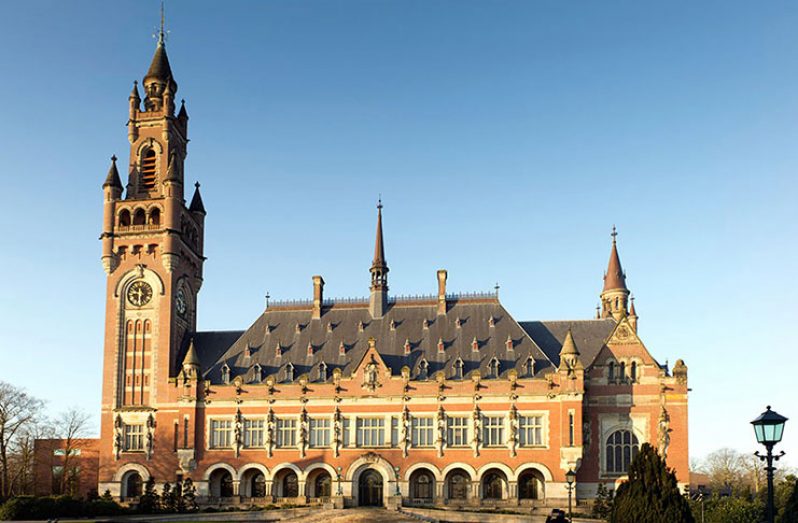…ICJ to determine jurisdiction after oral arguments
THE International Court of Justice (ICJ), in March 2020, will begin hearing arguments on whether it has jurisdiction over the case filed Guyana – Arbitral Award of 1899 (Guyana v Venezuela).
The Ministry of Foreign Affairs, in making the disclosure on Tuesday, said it welcomes the notification by the ICJ. The oral hearings will be held in The Hague from March 23 to 27, 2020.
“This hearing will determine whether the Court has jurisdiction over the case filed by Guyana on March 29, 2018. By that case, Guyana seeks to obtain from the Court a final and binding judgment that the 1899 Arbitral Award, which established the location of the land boundary between then-British Guiana and Venezuela, remains valid and binding, and that Guyana’s Essequibo region belongs to Guyana, and not Venezuela,” the Foreign Affairs Ministry explained in a statement.
Guyana filed its case before the ICJ after United Nations (UN) Secretary-General, António Guterres, in January 2018, referred the controversy between Guyana and Venezuela to the world court. In taking his decision, the Secretary-General was exercising the power vested in him in the 1966 Geneva Agreement between Guyana, Venezuela and the United Kingdom to decide how the controversy should be settled, the Foreign Affairs Ministry explained.
In a letter to the Court, Venezuela contended that the Secretary-General exceeded his authority under the Geneva Agreement, and that the Court therefore lacks jurisdiction to adjudicate Guyana’s lawsuit. On that basis, Venezuela has indicated that it will not participate in the proceedings. On November 19, 2018, Guyana submitted its Memorial to the Court refuting Venezuela’s arguments and demonstrating that the Court has jurisdiction.
“Under well-established judicial precedent, the Court will proceed to decide if it has jurisdiction over Guyana’s claims, irrespective of whether or not Venezuela participates in the proceedings. If it decides that it has jurisdiction, the Court will proceed to rule on the merits of those claims, and decide whether the validity of the 1899 Arbitral Award and the border between the two States should be confirmed,” the Foreign Affairs Ministry said.
It noted that under the United Nations Charter and the Court’s own rules, its final judgments both on jurisdiction and the merits will be legally binding on Guyana and Venezuela, whether or not Venezuela participates in the proceedings.
Nonetheless, Guyana remains hopeful that Venezuela will participate, to indicate respect for the Court and the international rule of law, the peaceful settlement of disputes, and the promotion of friendly relations between both States. “The Government of Guyana welcomes the prospect of a final and binding decision by the Court that will definitively resolve this longstanding controversy, and allow Guyana and Venezuela to proceed to develop excellent and close relations as neighbouring states,” the ministry stated.
Although it is contending that the ICJ lacks jurisdiction to adjudicate Guyana’s lawsuit, Venezuela failed to submit its Counter-Memorial on Jurisdiction – in response to Guyana’s Memorial on April 18, 2019 – a date which was fixed by the court.
In its submission, Guyana pointed out that the boundary with Venezuela was established by an arbitral tribunal constituted pursuant to a treaty concluded by Venezuela and Great Britain in 1897.
It said the record would show that Venezuela accepted the unanimous award rendered by five eminent jurists on October 3, 1899. The Spanish-speaking country had also participated in a joint commission to demarcate the boundary on the ground, and insisted on the award’s strict implementation.
“Only decades later did Venezuela, in anticipation of Guyana’s independence, cease recognizing the award’s validity and binding nature, using that pretext to lay claim to more than two-thirds of Guyana’s territory,” the country noted.
In an effort to ensure a final resolution to the controversy through peaceful means, the Government of British Guiana, Venezuela and the United Kingdom concluded the Geneva Agreement on February 17, 1966. Article IV of that treaty authorizes the Secretary-General of the United Nations to decide which of the means listed in Article 33 of the United Nations Charter shall be used to resolve the controversy. Notably, it includes binding adjudication by the ICJ. In agreeing to Article IV, Venezuela consented to the Court’s jurisdiction in the event the Secretary-General decides that the controversy should be resolved by the Court, Guyana stated.
“Efforts over more than half-a-century, including a four-year Mixed Commission (1966-1970), a twelve-year moratorium (1970-1982), a seven-year process of consultations on a means of settlement (1983-1990), and a twenty-seven-year Good Offices Process under the UN Secretary-General’s authority (1990-2017), all failed to end the controversy. On 30 January 2018, United Nations Secretary-General António Guterres, acting under the authority bestowed upon him by the Geneva Agreement, chose adjudication by the Court as the means for resolving the controversy with finality,” the Government outlined.
Guyana’s representation before the Court is led by its agent Foreign Secretary at the Ministry of Foreign Affairs, Carl Greenidge; and by its co-agents, Sir Shridath Ramphal and Ambassador Audrey Waddell.




.jpg)










